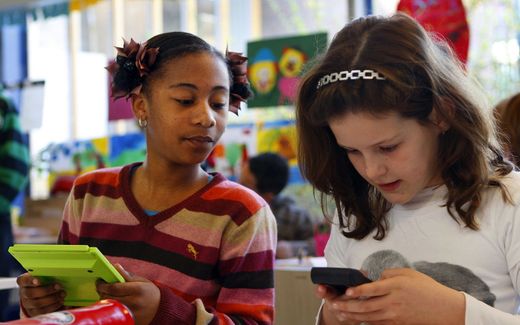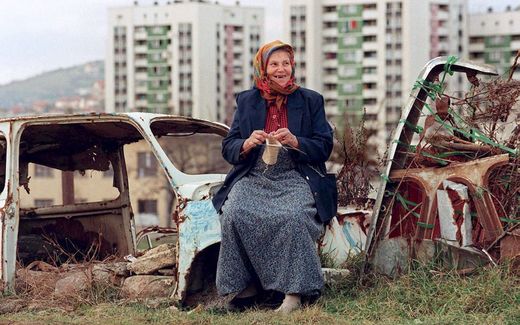Longing for your child to come home
27-12-2022
Christian Life
Hanneke Klein-den Hertog, RD

Photo RD, Jos Ansink
Christian Life
Slamming doors, cold looks, Shouting or icy silence: families often lack the unity that would benefit every family member. How can parents restore a troubled relationship with their child?
On the surface, John* and his wife are doing well: lovely family, good job, beautiful house. Yet all that glitters is not gold. Things were brewing at home. "Our eldest son David*, in his early twenties, no longer wanted to adapt to family life," John tells us from a comfortable armchair. "If he didn't like the meal, he would grab a pizza and eat it in his room. He would throw a tantrum if something were not to his liking." The atmosphere in the house suffered because of David's behaviour. "A younger daughter told me it wasn't so nice here anymore. Insecurity was creeping in. When you hear your older brother cursing and ranting a few times a week, that's pretty intense."
Promise
John and his wife try to have a conversation with their son, but it does not help much. "He often promised improvement but had forgotten that promise by the next day," says John.
The relationship with the church is also strained. "David had doubts about faith, about creation. Found that we were too picky with everything. It was often not easy to get him to join us on Sundays." The young man does not respond to attempts of the church to make contact. With the youth in the church, he has no connection.
John feels sadness and guilt: his son wants to go out into the wide world, he notices. His parents fail to reach him. "I wondered if I pointed out to him enough the only thing necessary if I have been a living example," John says.
Peace
When the eldest son goes to live on his own in the city, peace returns to the family. There is a relief. Yet John is deeply worried. Although he does not know exactly how his son spends his time, he fears loyal church attendance has disappeared.
It becomes a matter of prayer for John. "When talking to my son was no longer possible, I talked to the Lord about him. I pleaded on God's honour. Only He could bring my son back home and to church."
Prodigal son
Almost a year after the move, John gets a text message from David: the high inflation makes it hard to make ends meet. He wants to move back home. "I became silent with wonder. The Lord allows himself to be prayed for. The financial situation became a reason to return home, just like with the prodigal son."
Although John's parents are happy that David wants to move back home, they fear their son will fall into old patterns. The other children also worry that the atmosphere in the house will become hostile again.
Therefore, John and his wife talk to their son again about the house rules. David agrees to go with them to church and attend catechism. The young man is calmer, John notices. Things are improving in the family. "He goes to the gym with a sibling and withdraws less from family life," he says. The tantrums are over. And for the first time, he takes his Bible to church and sings the psalms with us."
Although things are calmer in John and his wife's family, it is still challenging to be open with each other. "I myself also find it difficult to share with my son how much I prayed for him. As a parent, when you show your inner self to your children, you get openness back. The detachment then disappears. I think in our family, but also in the denomination as a whole, there is too little talking."
Brokenness
David's story is not an isolated one, Hans Scherphof knows. In his work as a counsellor, he encounters much brokenness in relationships between parents and children. Scherphof serves four different church congregations in the Dutch town of Genemuiden. People from town can come to him with various requests for help. "We live outside paradise. The deep traces of sin are clearly visible. I don't believe it is perfect in one family."
The Dutchman himself has three children aged 16, 14 and 10. He knows from his own experience that parenting is not easy. "My wife and I sometimes say to my eldest: we did not study fatherhood or motherhood; we still have a lot to discover." Finding a way together as parents and child that's what Scherphof believes it's all about.

Yet he sees that practice in Christian families is unruly. Hot heads and cold hearts, miscommunication, and clashing characters can create tensions in the home. "In a conflict, people sit opposite of each other. They think in terms of right and wrong. The connection is gone, which is disastrous in the relationship between parent and child."
The counsellor focuses on getting people to reflect on their own actions. "Often, someone points at the other person who does everything wrong. That is an attack; the other person starts defending himself. If, on the other hand, you tell why you don't like something, you also give the other person space to tell their story. Then you really get a conversation."
Acknowledging sins
Like Scherphof, American author Margy Tripp argues that reconciliation begins with self-reflection. In her book "It's Not Too Late!" she gives tools, supported by Bible texts, to parents who want to restore the relationship with their teenager or adult child. She outlines the pain of parents who see their child getting the wrong friends, using drugs or no longer wanting to know anything about faith. And she challenges parents to examine their own role in parenting. As a father and mother, you are a representative of God to your children: have you shown the right image of Him?
Eline van Zelst, a psychosocial counsellor at the Reformed "Schuilplaats Foundation", also believes that when parents have a troubled relationship with their child, they should start with themselves and look beyond the child's behaviour. "Don't think too quickly: how annoying my son or daughter is acting," she says.
Environment
It is good to realise how vital the role of parents is for a child, Van Zelst argues. "Parenting does not start at puberty, but from birth. If you are very closed off yourself, you cannot expect openness from your child. As a parent, you are the most important example for your child, besides, for example, the environment at school, which is also very important. Therefore, practise being open about your feelings."
When people knock on her door because of trouble at home, they want the arguments to stop, Van Zelst says. "I try to point out to them that negative behaviour exists for a reason. It can be a way for a child to signal that something is bothering them."
In doing so, the counsellor wants parents to think about the origins of their child's behaviour. "Arguing, for example, is for children and a way of indicating their boundaries," she says.
Meals
And thus, Van Zelst tries to explore how you can reverse interactions in the family. She mentions the table setting as an example. "Meals can be a wonderful moment of the day, where you meet, pray together and read from the Bible. But sometimes, the meal degenerates into discord. Putting children in a different place can help keep the peace."
What if a child increasingly removes himself from family life and goes his own way? "Try to find out what the causes are," advises Van Zelst. "Start the conversation. This can also be done during a walkabout."

At the same time, psychopastoral counsellor Scherphof argues that getting through to a child can be very difficult. "I sometimes say that adolescents are sometimes closed due to renovation. Then you just don't get to a good conversation."
Shame
People often prefer to keep problems in the family to themselves, even though they are widespread. Shame plays a role in this, Scherphof knows. "If there is frequent disagreement in the family, it feels like you are failing as parents. While I don't think you should approach conflicts that way. Parenting is challenging, especially in our busy society. Let's not push the tasks under the carpet."
Scherphof and Van Zelst advise parents struggling with parenting not to keep their doubts to themselves. Van Zelst: "They do say that sharing is multiplying. You can learn so much from each other. Friends sometimes give better advice than social workers."
During parenting group meetings, Scherphof notices that parents often have an aha-erlebnis (enlightening experience). "They struggle alone and think they are the only ones with whom things are difficult in the family. At such a meeting, they notice that they are not alone."
Scherphof does understand that the threshold for sharing problems with the outside world can be high. He knows that people sometimes feel their concerns are out in the open. That people are not talking with them but about them. "Then you do come home with a cold shoulder. Such an experience makes one cautious."
Meanwhile, it is precisely in the church that we are given to each other, says Scherphof. "With baptism, your children become children of the church. We bear responsibility for each other. It is best to underline that. Practically, you can fulfil this by sharing your concerns with each other at a marriage catechesis or parenting meeting. Unfortunately, individualisation does not pass by our denomination either, and responsibility for each other is sometimes forgotten."
Letting go
From the moment the umbilical cord is cut, parenting means letting go, Van Zelst argues. This is difficult, and it becomes even more complicated when the child goes a different way than you would like. Yet a parent cannot force their adult son or daughter to go to church with them. What remains when you no longer have any influence over your child's choices is love, says Van Zelst. "That is a Biblical norm, but it can also be challenging."
Scherphof also stresses the importance of unconditional love, as does the American author Tripp. She points to the Lord Jesus, Who sought out the lost. Thus, if it is correct, parental love does not end when a child marries someone of the same sex or when a grandchild is born outside of marriage.
What gives Scherphof peace in the turbulent parenting world? "We put our children in God's hands at night. We ourselves do what we can, but ultimately only the Lord can give the blessing." John, too, experienced that when he himself could no longer reach his son, the way of prayer remained. "Even if your child is far away, God is powerful to bring him back," he says.
John and David are pseudonyms. Their real names are known to the editors.
This article was translated by CNE.news and published by the Dutch daily Reformatorisch Dagblad on December 23, 2022.
Related Articles





